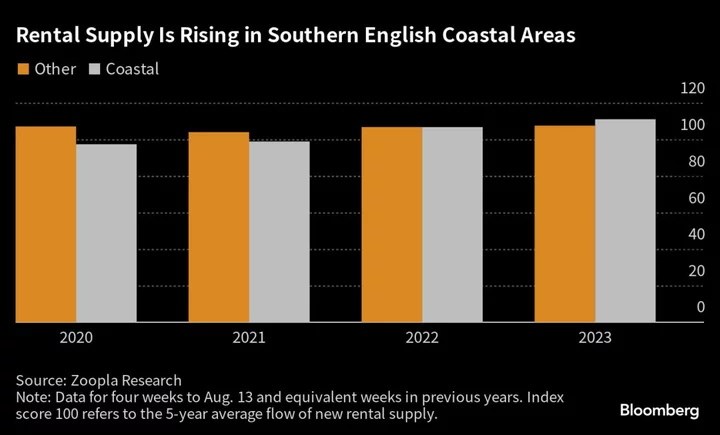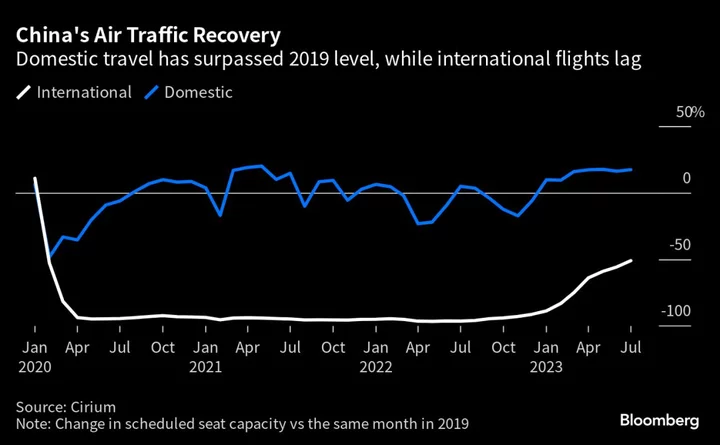For the aspirational middle classes, it seemed a no brainer: buy property in one of Britain’s holiday hot-spots and rent it out to the wave of visitors who flooded in during the so-called “staycation” boom of recent years.
Many families had built up savings during Covid lockdowns and mortgages were still relatively cheap. Few predicted an historic rise in interest rates, soaring inflation and a changing market as Brits reignited their love for foreign holidays instead of domestic tourism.
“There was a mad rush to short term lettings in 2021,” said Alistair Handyside, chair of the Professional Association of Self Caterers UK, which represents the sector. People liked the idea of acquiring another “property that they could let out and make easy money.”
As it turns out, things aren’t so easy. The number of holiday-let limited companies set to be struck off the Companies House register rose from just over 300 in July 2021 to more than 550 in July this year, according to data from estate agent Hamptons. This normally happens when a business is being wound up, voluntarily or due to unpaid debt.
Read More: Jobs Dry Up in England’s Seaside Towns as Staycations Dwindle
Simply Sea Views, a website listing cottages around the British coast, said bookings were 12% lower in the first half of 2023 compared with 2021. Last year saw a particularly sharp drop, with Cornwall — a popular area for holidays — down by a quarter after gaining the most new lettings during the pandemic.
“The pendulum well and truly swung back from the 2021 staycation boom,” said Josh Williams, Simply Sea Views’ owner.
Flying High
Britons have enjoyed summer trips to the Mediterranean since the advent of affordable flights, and returned to their holidaying habits once Covid restrictions were lifted. The effect can be seen in England’s west country, known for its relatively sunny weather and sandy beaches.
“I’ve seen hosts in Cornwall advertising discounts for August – which is usually fully booked,” said Viki Herbert-Coulson, whose family has been running holiday lets in the area for almost two decades. “That didn’t happen before the pandemic.”
A resurgence in foreign holidays appears to have dented demand for staycations. London’s Heathrow airport reported 37 million passengers in the first half, compared with 26 million in the same period last year, while travel company TUI AG said UK bookings this summer were 4% higher than pre-pandemic levels.
Faced with less demand from holidaymakers, some landlords are switching to long-term rents. The supply of homes for rent has been stronger in the south west in 2023 than the average level across southern England, according to property website Zoopla. This is a marked reversal from the pandemic boom, when supply in coastal regions dipped by nearly 10%.
The turnaround “is in line with the return of international holidays and a drop in the number of people holidaying at home,” said Richard Donnell, executive director of research at Zoopla.
Webbers, an estate agent with branches across Cornwall, Devon and Somerset, started advertising that it could help holiday lets owners pivot into the long-term market, after noticing an uptick in conversions. “There’s definitely been an increase in the last year,” said Grace Harper, a lettings manager. “Owners are coming to us, saying that running costs are too expensive and they weren’t booked up as much as they had been previously.”
Homes for Locals
Elaine Slatter was at a restaurant in the rural village where she owns a holiday rental when a local resident approached her, desperate for a house to move into. The encounter convinced Slatter to convert her property – which she had acquired over lockdown – into a long-term let. Sympathy spurred her decision, but it also made fiscal sense.
“The cost of living crisis made a massive dent in any profit we made. The laundry service has gone up, petrol has gone up, the electricity has gone up, and we gave pay rises to the local people we employed for cleaning,” she said. “People are going abroad, and the local market for holiday lets is over-saturated. We were making a slimmer and slimmer margin.”
The change in the rental market is welcome for some. During the staycation boom, protests arose in popular tourist destinations as local communities were hit by severe shortages in housing, exacerbated by homes being turned into holiday lets. The subsequent change in the market is “brilliant for locals, because of the huge shortage of properties for long term lets at the moment,” said Julie Deacon, a local lettings manager at Webbers Bideford. “It’s putting out more stock for local people.”
Slatter, after converting her holiday let, agreed. “It feels good knowing I’ve helped two local people stay in the village,” she said.
Red Tape
The pressure on Britain’s holiday lets sector comes amid a regulatory clampdown. In Wales, a rule launched in 2022 imposed higher taxes on holiday properties unless they are booked for 182 days per year.
Welsh landlords and companies are offering discounts to hit the target, according to the lobby group PASC UK. It said as many as 40% of holiday lets owners in Wales are considering selling due to the new regulations.
“Eighteen months ago, you couldn’t buy a holiday cottage on the St David’s Peninsula for love nor money,” said Carol Peett, owner of the buying agency West Wales Property Finders. Now, she said, “there are pages of them and the economy which is reliant here on tourism is being ruined. It is dreadful.”
In Scotland, new licensing requirements are deterring holiday-let landlords and have created a bureaucratic backlog. In England, a consultation is underway on a possible registration program.
Industry members say regulations can backfire and harm the same local communities they are intended to protect.
“The trouble is, in a rural area, if you put those holiday cottages out of business, you put the local pub out of business as well,” said Handyside of PASC UK. “It’s the visitors who spend money to keep the pub going and not the local community.”
In the long run, the sector could get a reprieve from an unlikely source: climate change. Scorching summers in the Mediterranean may convince people to return, once again, to the UK’s own coastal attractions.
Read More: Londoners Want Brighton Now, Not Ibiza
“Extreme temperatures abroad will make a lot of people re-think where and when they holiday,” said Williams from Simply Sea Views. “Families in particular aren’t going to keep risking being caught up in heat-waves and wild fires.”
--With assistance from Damian Shepherd and Anthony Palazzo.









